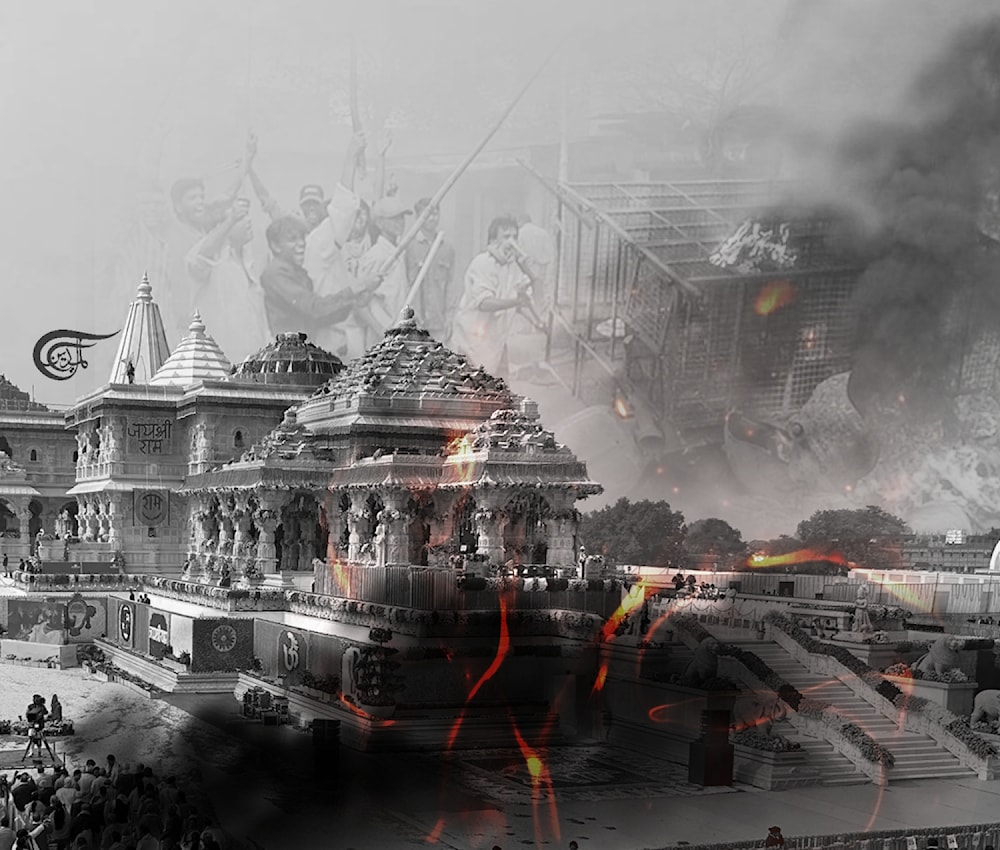The 2024 Ayodhya Consecration is a Symbol of Anti-Minority Bigotry
Despite the post-consecration clashes, it is a known fact that communal violence is not a novel phenomenon in India, and Muslim casualties from Hindu supremacists have been the norm under Modi’s government.
-

The 2024 Ayodhya Consecration is a Symbol of Anti-Minority Bigotry (Illustrated by Hadi Dbouk to Al Mayadeen English)
The consecration of the Ram Temple in the city of Ayodhya in 2024 has confirmed India’s status as a Hindu supremacist country. The thin veneer of secularism has been exposed to the core, as the consecration took place where the now demolished Babri Mosque once stood. The 1992 demolition became a major flashpoint of communal violence between Muslims and Hindus in India which includes the 1993 Mumbai killings and the 2002 Gujarat pogrom of which the latter was linked to pilgrims returning from Ayodhya. The truth is that India’s secular credentials where fractured back then and in 2024, it has been completely eroded. This consecration is simply, nothing but a symbol of anti-Muslims bigotry.
The pomp with which the consecration took place amid India’s leading businessmen and film stars attending the event clouds the innately controversial character of the temple which is a product of communal demagoguery instead of religious considerations. While it is true that Ram is one of Hinduism’s most revered deities, the purported claim that Ayodhya is his birthplace was used to galvanize the Hindu right-wing to attack Muslims with impunity. Chilling scenes of a mosque being demolished in 1992 under the watch of then Prime Minister Narasimha Rao remains etched in Indian Muslim consciousness and have also hurt the sentiments of Muslims living in Bangladesh, Pakistan and beyond. The deaths of over 2,000 Muslims in cities such as Delhi, Mumbai, Bhopal, Kanpur and Surat after the demolition is also a dark chapter in India’s unenviable history as a so-called secular democracy.
Now in 2024, one of the architects of the Gujarat pogrom of 2002 which resulted in thousands of Muslim deaths in the state, is seen opening a temple and appealing to his Hindu voter base in the process. The opening by Modi is a polarizing move in a country where Hindu supremacy has become deeply entrenched since he assumed power in 2014. This is despite the fact that in 2019 the Indian Supreme Court ruled in favor of the pro-Ram segments of the population by providing a legal cover to build a temple where the Babri Mosque once stood. The 2024 consecration now symbolizes how India belongs to Hindus only and rank outsiders or invaders such as Muslims had no right to define the destiny of a country which equally belongs to them.
No more is this evident than the scenes of communal violence after the consecration of the temple in Ayodhya. Alarming visuals of a church being vandalized and mob violence in Mumbai against a Muslim man have been extensively covered in international media while the Indian media remains fixated in glorifying the consecration as a divine event. Clashes also erupted in the West Bengal city of Howrah with chants of ‘Jai Shree Ram’ or ‘Glory to Lord Ram’ preceding attacks on the Muslim community. Muslims shopfronts were torn down in India’s financial capital, Mumbai with Aaker Patel of Amnesty International stating that the tearing down drive in the city represented a policy of arbitrarily and punitively demolishing Muslim properties.
Yet despite these post consecration clashes, it is a known fact that communal violence is not a novel phenomenon in India and Muslim casualties from Hindu supremacists have been the norm under Modi’s government. The opening of the Ram Temple however, ensures that attacks become commonplace especially against innocent Muslims including those vehemently disapproving of the temple’s construction or calling out Hindutva as a toxic, fascist and exclusionary ideology. Muzzling out dissenting voices on the Ram Temple whether it is from Hindus themselves, is also a strategy employed by the Modi-led BJP government to brandish India’s credentials as a Hindu-only nation.
Ironically, Indian politicians have claimed that communal tensions will be eased after the consecration of the temple which blatantly ignores how such diffusions are driven by fear in minority communities. The Delhi riots of 2020 which coincided with former US President Donald Trump’s visit to India resulted in widespread looting and carnage against the Muslim population in the capital and is a stark reminder that Muslims will remain politically and economically powerless. Under Modi’s India, Muslims are often hounded and censured for being sympathetic towards Pakistan despite a rejection of Muhammad Ali Jinnah’s ideology and embracing Mahatma Gandhi’s ideals instead.
The Ram Temple in Ayodhya will only fuel further hatred by constantly reminding the Muslims of India that they are second-class citizens and subservient to Hindus. It is also a reminder, that the narrative of majoritarianism will prevail in Ayodhya regardless of the controversial nature of the ‘evidence’ cited by Saffron extremists to raze the Babri Mosque of a non-Muslim structure lying beneath it. Dr. Ruchika Sharma of the Jawaharlal Nehru University has questioned the methods that archaeologists have used to determine that a Hindu temple existed under the Mosque including conclusions generated from a ‘survey’ rather than an excavation. Yet, the Mosque was razed in 1992 and a controversial consecration of the Ram temple took place in 2024.
The temple itself, its history, and the manner in which Hinduism is being weaponized to target minorities will remain a blemish on India’s hypocritical adherence to secularism. It is hence, unsurprising that the Secretary General of the OIC denounced the opening of the temple on the demolished and historic Babri Mosque. The truth is that India is now a demagogic, anti-Muslim nation and the Ayodhya consecration is nothing but a symbol of anti-minority bigotry.

 Hamzah Rifaat
Hamzah Rifaat
 6 Min Read
6 Min Read











